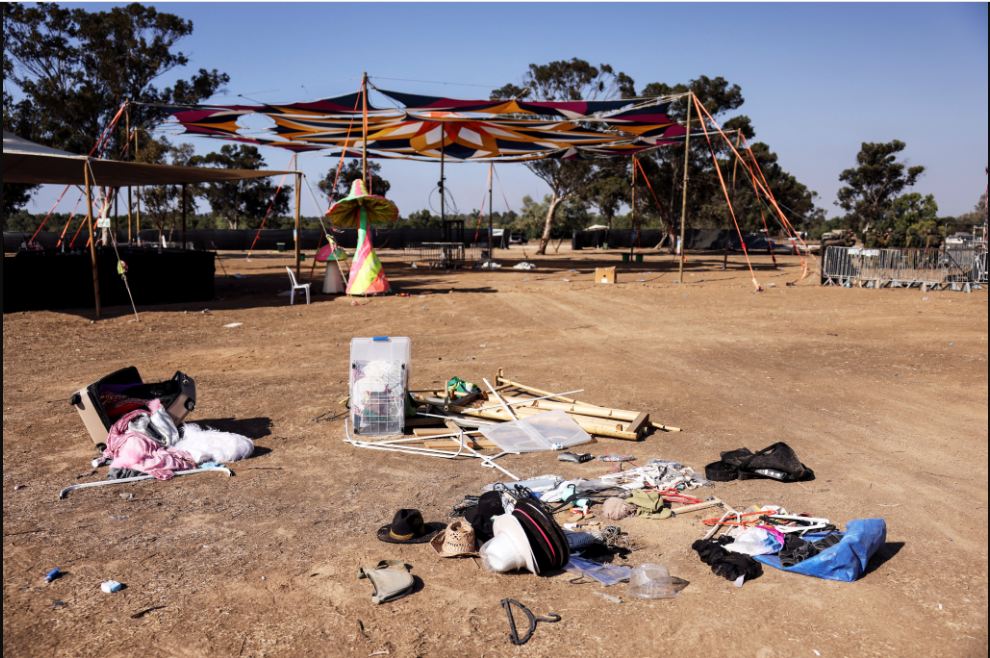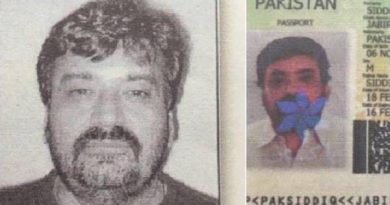Israeli accounts of sexual violence by Hamas rise but justice is remote
Jerusalem (Reuters) – On Oct. 7, the day Hamas attacked, the Israeli military set up an impromptu morgue of refrigerated shipping containers at the Shura defence base in central Israel to identify and prepare the dead for burial. Of the 1,200 people killed that day, authorities said at least 300 were women.
“Often women came in in just their underwear,” said Shari Mendes, a reservist who worked for two weeks at the base helping medics with fingerprinting and cleaning female soldiers’ bodies.
“Sometimes we had people who – we just had a torso, okay – or they were very decomposed or they were mutilated,” Mendes said. “I saw very bloody genitals on women.”
Israeli police are investigating possible sexual crimes by some of the few hundred people that they arrested after the Oct. 7 attack. Their goal is to try every suspect they have in custody.
But at the morgue where Mendes worked, the women’s clothes were buried with them before police investigators could examine them. In Jewish burial law, the dead must be treated with dignity and laid to rest as soon as possible. Everything that is a part of the body is buried together, so some women were buried with their bloodstained clothes.
“We wiped everything clean of blood,” Mendes told Reuters.
It’s just one of the challenges facing the investigation into the alleged sexual crimes committed during the attack, the bloodiest in Israel’s 75-year history.
At some sites battles raged for days, making it impossible to enter. Some evidence was gathered, but police say they face a challenge after opportunities were lost to gather perishable evidence to link atrocities to specific suspects.
An Israeli military spokesperson told Reuters the first priority in the mass casualty event was to identify corpses so families could be informed as soon as possible. In the first days, many did not know if their relatives were dead, wounded or taken to Gaza.
Israel’s justice ministry has said “victims were tortured, physically abused, raped, burned alive, and dismembered.” Hamas vigorously denies the allegations of sexual assault or mutilation by members of its armed wing, the Izz el-Deen al-Qassam Brigades, on Oct. 7 or after that.
Mendes’ account is one of seven given to Reuters by first responders or others dealing with the dead that attest to alleged sexual violence. Those people said they found women semi-naked, bound, eviscerated, stripped, bruised, shot in the head or torched, at two communities including Kibbutz Beeri, and at an open-air music festival near the Gaza border fence.
Reuters reviewed images matching some of the descriptions or attesting to other possible atrocities. However, it could not independently verify all the accounts.
Taher al-Nono, the media adviser to the head of political bureau of Hamas, denied Hamas fighters were responsible for any sexual assaults in the attack and called for “a serious and impartial international investigation into the matter”.
A U.N. commission of inquiry investigating war crimes on both sides of the Israel-Hamas conflict will probe the allegations of sexual violence by Hamas, amid Israeli criticism the U.N. had remained silent. Israel accuses the commission of bias and has said it will not cooperate with the investigation.
Victims Dead, Traumatized
In Israeli criminal law, sexual violence includes rape, but also indecent acts, harrassment and sexually demeaning a person – including forced nudity – among other offences. A conviction can be based on testimonies and circumstantial evidence even without forensic evidence, three legal experts told Reuters.
But among the obstacles facing police investigators, they have said, is the fact many victims are dead or traumatised.
An estimated “few dozen” surviving victims and witnesses have already sought help, said Orit Soliciano, head of Israel’s Association of Rape Crisis Centres, declining to name any to protect their privacy. It can take years before a victim or witness comes forward, she said.
Many purported victims have no voice.
“All the women who were murdered and may have suffered sexual violence cannot tell us,” Hila Neubach, director of legal affairs at the Association for Rape Crisis Centres in Israel, told Reuters. “Witnesses perhaps too did not survive.”
Authorities have placed a gag order on the investigation but commander Shelly Harush told parliament on Nov. 27 they have 1,500 testimonies on atrocities including sexual violence, rape and genital mutilation from survivors, security forces, first responders and families of victims. At least a dozen graphic testimonies have been shared by government agencies and first responders.
Decomposition
Sometimes it took days after the Oct. 7 attack to reach the bodies. Chen Kugel, Head of the Israel National Center of Forensic Medicine, said ordinary protocols for forensically proving rape are nearly impossible when bodies arrive in such a stage of decomposition. “Maybe if we had checked them in the first 24 hours (that would be possible),” Kugel said.
Even in normal times, roughly 80% of sexual offence cases in Israel are closed every year because prosecutors see insufficient evidence, justice ministry data show. Prosecuting the Oct. 7 cases will require a different approach.
“In a criminal case, a specific defendant is convicted of harming a specific victim,” said Dana Pugach, law professor at Ono Academic College. “They will have to look at an entirely different legal construct in this case.”
Prosecutors could rely on a legal doctrine of shared responsibility, she said – one used in Israel earlier this year to convict 11 people of sexual violence for gang rape.
For that, proof of intent and co-conspiracy will be needed.
Testimony
The testimonies are mounting. At the Shura base, Rabbi Israel Weiss told reporters some bodies were naked and “torn apart.”
Nachman Dyksztejn, a volunteer for Zaka Search and Rescue who was at the festival, wrote in testimony shared by Zaka with Reuters that he saw dozens of dead women in shelters: “Their clothing was torn on the upper part, but their bottoms were completely naked.”
Concert producer Rami Shmuel, who helped in the festival searches for casualties, said he saw the bodies of three women, one naked and the other two stripped from the waist down. One was clearly shot in the back of the head, he said, and torched.
Police say they have over 60,000 “visual documents” including videos from Go-Pro cameras worn by attackers, CCTV footage and images from drones.
Online video clips amplify the allegations. Some of those purporting to show sexual violence could not be authenticated – one seen by Reuters appeared to date to 2021.
The news agency verified the locations of two other videos that suggest sexual violence, shared on social media within a day of the attack. Reuters could not confirm who first posted them.
Of these, one showed the half-naked body of a woman from the festival, later publicly identified by her mother as tattoo artist Shani Louk, slung across the back of a pickup truck and paraded through Gaza.
The other showed a young barefoot woman, also identified to Reuters by her mother, being pulled by the hair from the trunk of a van in Gaza and shoved into its back seat by an armed man amid shouts of “God is great.” Her hands are tied. The seat of her trousers appears bloodied as do her ankles and arm. The image does not show what happened to her.
Israeli authorities have confirmed Louk is dead. They believe the other woman is alive in captivity in Gaza.
On Nov. 14, police showed reporters footage of an unnamed witness of the festival attack. In it, she said she saw gunmen gang rape one woman and cut off the breast of another and throw it on the street. Later, she said, a gunman shot the woman in the head while raping her. Police declined to name the witness or make her available to Reuters.
Witness accounts alone cannot always secure an indictment or conviction, said legal expert Neubach. But overall, she said, the information already accumulated is reliable enough to determine that sexual and gender-based violence has likely been perpetrated.
Court
If prosecutions in Israel prove challenging, the International Criminal Court (ICC) in The Hague was set up to prosecute those responsible for war crimes. It has already said it has jurisdiction over atrocity crimes committed by Palestinians on Israeli territory that day.
The tribunal can step in if states are unwilling or unable to prosecute war crimes committed by nationals of its members, or on the territory of its members. The ICC says its prosecutor has collected a significant volume of information and evidence.
Israeli lawyers say its evidentiary requirements on sexual violence are less challenging than Israel’s. For example, it does not need victim testimony. The non-consent of victims mostly does not need to be separately established if the acts take place during mass atrocities.
Two lawyers told Reuters they are preparing evidence to present there. Tel Aviv-based Yael Vias Gvirsman is gathering evidence for families of 54 victims which will include victims of sexual and gender-based violence, she said. She declined to provide details but said there are a few key witnesses.
But for the Israeli state, the ICC is problematic: Israel does not recognise its jurisdiction – although Israeli individuals and the state itself are free to submit evidence.
“That brings us to sort of, I’ll call it the Israeli dilemma,” Vias Gvirsman said, referring to where such cases could be judged. Israel may hold some perpetrators but does not have reach of the instigators, commanders or aiders and abetters that the ICC could bring to trial, she said.
She and another attorney expect the Israeli government eventually to turn to the ICC. Israel’s Justice Ministry declined to comment on whether it would turn to the tribunal but said it would pursue legal proceedings against those responsible for the Oct. 7 attacks, wherever they are.
“Normally the Israeli Defence Force, the Israel government, would say ‘we have no dealings with the ICC,'” Geert-Jan Knoops, lead defence counsel at the tribunal, told Reuters.
“But this is going beyond any imagination. I think Israel has the interest to provide the evidence to the ICC prosecutor and for the Oct. 7 events.”



